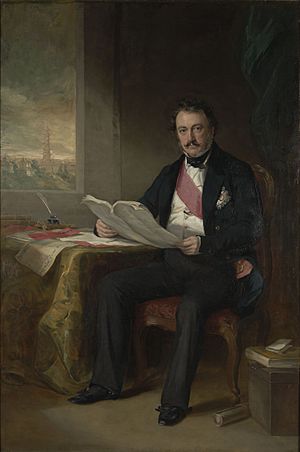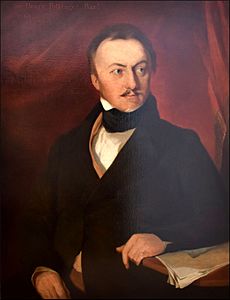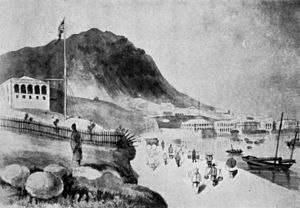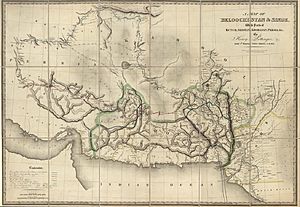Henry Pottinger facts for kids
Quick facts for kids
Sir Henry Pottinger
|
|
|---|---|

Portrait by Francis Grant, 1845
|
|
| 1st Governor of Hong Kong | |
| In office 26 June 1843 – 8 May 1844 |
|
| Monarch | Victoria |
| Lieutenant | Sir George D'Aguilar |
| Preceded by | Office established |
| Succeeded by | Sir John Davis |
| Governor of the Cape Colony | |
| In office 27 January 1847 – 1 December 1847 |
|
| Preceded by | Sir Peregrine Maitland |
| Succeeded by | Sir Harry Smith |
| Governor of Madras | |
| In office 7 April 1848 – 24 April 1854 |
|
| Preceded by | The Marquess of Tweeddale |
| Succeeded by | The Lord Harris |
| Personal details | |
| Born | 3 October 1789 Mount Pottinger, Ballymacarrett, Ireland |
| Died | 18 March 1856 (aged 66) Malta, British Empire |
| Resting place | Msida Bastion Historic Garden, Malta |
| Spouse |
Susanna Cooke
(m. 1820) |
| Relations | Eldred Pottinger (nephew) |
| Children | 4 |
| Signature | |
| Military service | |
| Allegiance | |
| Branch/service | Bombay Army |
| Years of service | 1804–1856 |
| Rank | Lieutenant-General |
| Battles/wars | Third Anglo-Maratha War First Opium War |
Lieutenant-General Sir Henry Pottinger, 1st Baronet (3 October 1789 – 18 March 1856) was an important British soldier and leader. He is best known for becoming the first Governor of Hong Kong. He also served in India and South Africa, playing a key role in British history during the 19th century.
Contents
Early Life and Education
Henry Pottinger was born on October 3, 1789, in Ireland. His family lived on an estate called Mount Pottinger. He was one of eight sons and three daughters.
Henry went to Belfast Academy until he was 12 years old. In 1803, he moved to India. He first joined the East India Company's shipping service. The next year, he joined their army instead. He learned local languages in Bombay and even became an assistant teacher. By 1809, he was a lieutenant.
Adventures in India
Pottinger was a great explorer. He traveled through lands between India and Persia. He often disguised himself as a Muslim merchant to learn more about the areas. This was done under orders from Sir John Malcolm.
In 1809, he fought as a lieutenant in the Third Anglo-Maratha War. This was a conflict in India.
Secret Missions and Discoveries
In 1810, Pottinger and Charles Christie went on a secret trip. They traveled from Nushki to Isfahan, disguised as Muslims. Christie went north, while Pottinger went west across two deserts. They met up again in Isfahan. The East India Company paid for this trip. They wanted to map and learn about these regions. They were worried that French forces might try to invade India. It took 100 years before another European traveled this same route. Pottinger rose to the rank of Colonel. Later, he became a leader in Sindh in 1820. He also held a similar role in Hyderabad.
He returned to England in 1839. There, he was given the title of a baronet. This is a special honor.
A New Role in China

Pottinger was offered an important job in China. He became an envoy and a leader for British trade. This meant he would represent Britain in China. He replaced Charles Elliot in this role.
In 1841, he was told to look closely at Hong Kong. He was not to give up the island unless he found a better one nearby. This new island needed to be good for trade and easy to defend.
Pottinger left London on June 5 and arrived in China on August 10. His journey took only 67 days, which was a record at the time!
The Treaty of Nanking
Pottinger joined the British forces in northern China. He then helped to create the Treaty of Nanking in 1842. This treaty officially ended the First Opium War. It also gave Hong Kong Island to the United Kingdom.
Pottinger wrote about a special ceremony with his Chinese counterpart, Keying. They exchanged small portraits of their families. When Keying received a picture of Pottinger's wife, he showed great respect. He placed it on his head, which was a sign of high honor. This ceremony showed their hope for a long friendship between their families and countries.
Governing Hong Kong

Pottinger became the second Administrator of Hong Kong. Then, from 1843 to 1844, he became the very first Governor of Hong Kong. He believed that Hong Kong was important for trade. He also thought it was a good place to protect British people in China.
In April 1843, his home was robbed. He suggested creating a police force. He wanted four officers and 50 men from Britain. However, this idea was turned down because of the cost.
On June 26, 1843, he was also made the Chief Commander of British troops in Hong Kong.
Challenges and Decisions
During his time as governor, Pottinger set up two important groups. One group discussed political matters. The other group worked on creating laws. However, these groups did not meet often. This meant Pottinger had a lot of power to make decisions on his own.
Towards the end of his time, Pottinger faced challenges. He lost the support of some British merchants in Hong Kong. He left his position on May 7, 1844. During his time as governor, Hong Kong became a major port for trade with China.
Later Life and Legacy
Pottinger returned to Britain in 1844. He became a member of the Privy Council. This is a group of important advisors to the monarch. Many cities also honored him. In 1845, the House of Commons voted to give him £1,500 a year for the rest of his life.
In 1847, he served as Governor of the Cape Colony in South Africa. From 1848 to 1854, he was the Governor of Madras in India. He was promoted to lieutenant-general in 1851.
Sir Henry Pottinger passed away in Malta on March 18, 1856. He was buried in the Protestant cemetery, now called the Msida Bastion Historic Garden. You can still see a marble plaque there today.
Family
In 1820, Henry Pottinger married Susanna Maria Cooke. They had three sons and one daughter:
- Eldred Elphinstone Pottinger (born 1822); died as a baby.
- Frederick Pottinger, 2nd Baronet (1831–1865); he became a police inspector.
- Henry Pottinger, 3rd Baronet (1834–1909); he was a lawyer.
- Henrietta Maria Pottinger (died 1905); she married in 1850 and had three sons and a daughter.
Places Named After Him
Many places are named after Sir Henry Pottinger, especially in Hong Kong and Northern Ireland:
- Pottinger Street, Central, Hong Kong
- Pottinger Peak, Hong Kong
- Pottinger Gap, Hong Kong
- Pottinger Battery, Devil's Peak, Hong Kong
- Pottingers Entry, Belfast, Northern Ireland
- Pottinger House, Belfast Royal Academy, Northern Ireland
- Belfast Pottinger, a UK Parliament area
- Pottinger County, New South Wales, Australia
Honours and Awards
Sir Henry Pottinger received many honors for his service:
 1839 He was made a Baronet (Bt).
1839 He was made a Baronet (Bt). December 2, 1842 He became a Knight Grand Cross of the Order of the Bath (GCB). This is a very high honor.
December 2, 1842 He became a Knight Grand Cross of the Order of the Bath (GCB). This is a very high honor. May 23, 1844 He became a Member of Her Majesty's Most Honourable Privy Council (PC).
May 23, 1844 He became a Member of Her Majesty's Most Honourable Privy Council (PC).
Freedom of the City
He was also given the "Freedom of the City" in several places:
His Writings
- Travels in Beloochistan and Sinde. London: Longman. 1816.


